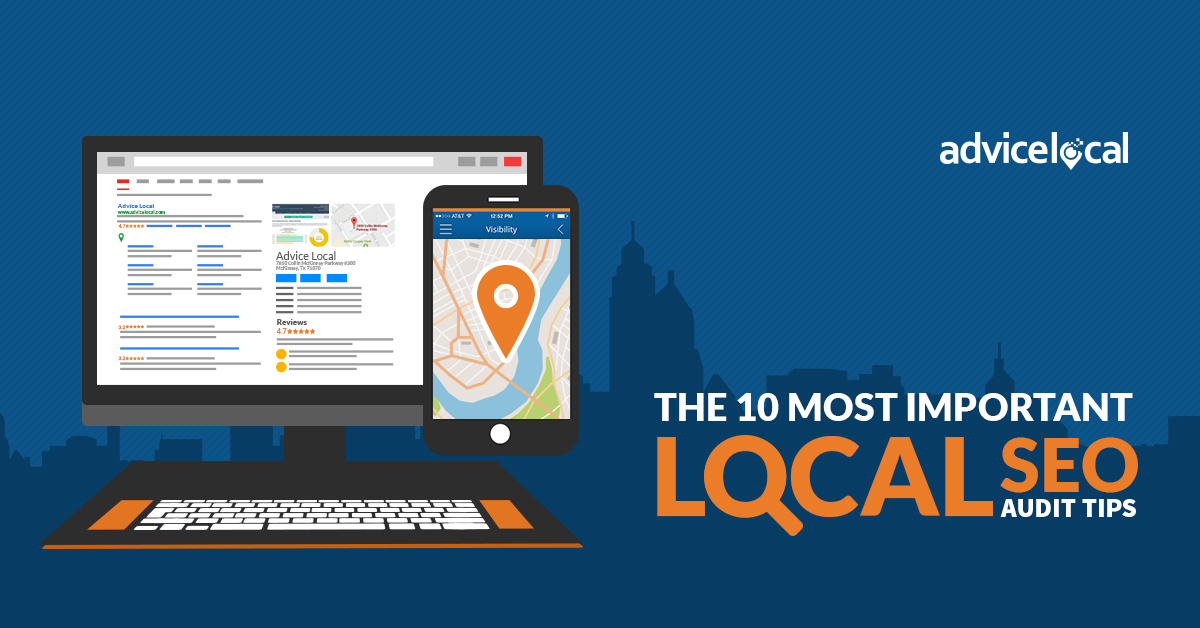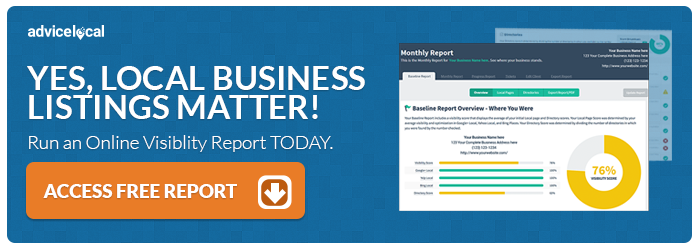At Advice Local we live and breathe local SEO. We want each and every business on the internet to succeed and increase its search engine rankings. One way a business can ensure they are relevant is to perform a local SEO audit of their website and for that matter, around the internet as well.
Today, I’m going to share 10 of the most important local SEO audit tips. This isn’t an all-encompassing list, but it’s a jumping off point that can result in success if done correctly.
10 Local SEO Audit Tips to Get You Started
1. SEO is Not a One-Time Event
Because information and listings on the internet often change, audits should take place regularly, usually every few months. There are lots of great tools to accomplish this. Here are a few SEO tools my team recommends.
2. Make Sure the Title Tags Are Optimized
Each page on the website should have unique, descriptive titles that will attract local customers and feed search engines the information they need to know about the website. Not sure what a title tag is? It’s the H1, H2, and H3s that you identify within the pages and posts through the website.
3. Clean Up URLs
Each URL on the website should be unique and well-formatted. If they aren’t, change them to a more descriptive, user-friendly format. Don’t forget to create 301 redirects for any links you change. Not sure what a URL is? The URL for this post is https://www.advicelocal.com/blog/10-local-seo-audit-tips/.
4. Yes, You Need Links
There are many different types of links and this alone could be it’s own audit. (As a matter of fact, here is an article I wrote about how to do a website link audit.) The basics are to confirm that pages link internally to one another and externally to authoritative websites. Don’t overdo it with links, and make sure the content you are linking to is relevant to the topic of the page. If not, this could be seen as spammy and search engines won’t rank your pages as high. You’ll also want to incorporate a link strategy for getting backlinks from other authoritative domains. The most important thing to remember with links is this: the objective is to keep visitors on the website longer and take them on a journey throughout to multiple pages.
5. Let Search Engines Know About the Website
Make sure search engines are indexing the website regularly, so any new pages and posts published will appear in search results. This is something that is completed through Google and Bing Webmaster tools. You’ll also want to regularly log in to these two tools and clean up any errors, such as pages that are giving 404 errors.
6. Update Social Media Profiles
Yes, social media can impact search engine rankings. If the business has an engaged audience on social media, not only will they have authoritative links going back to their website but also a positive reputation, which is something Google takes into account when determining placement in search results. Ensure that the information on the social media profiles is accurate and includes location-specific information, like local phone numbers and mailing addresses.
7. Study Your Competition
I can’t say this enough. Getting found by consumers is not getting any easier and the competition is stiff. Check up on the competition regularly to see what they’re doing online and how it is performing. The campaigns that seem to be working for them you should study closely and see how you can implement an improved version. Be sure to pay attention to the things that are failing, and save time by learning from their mistakes!
8. Mobile Isn’t Going Away
It’s simple, mobile is here to stay. Google will continue to increase the importance of mobilization as a ranking factor. Businesses that are not embracing mobile most likely are not being found by consumers searching from their smartphones and tablets. And if the consumer does find the website and it’s not mobile optimized they usually exit immediately. Don’t make the mistake of thinking you have audited the mobile experience for a website and that you’ll never need to do it again. Every time a page is changed on a website, a menu navigation is modified or a new feature is added, the mobile experience changes. Be sure to include mobile-friendliness as part of a regular local SEO audit.
9. The Results Are in the Numbers
It’s important to include a metric study in the audit. This is to identify where site traffic is coming from, how long visitors stay on the website, and which pages visitors are on when they exit. Study this and you’ll find out exactly how the business is performing on social media, in search engines, and with conversions. Once you find out what is working and what isn’t, you can either repeat the process or change it.
10. Go Pro
In addition to performing the audit you’ll need to be able to make the necessary changes to the website to improve it. If you have the technical ability to do both, that is great. But if you don’t that’s OK. Get the help you need and spend your time focusing on the things you enjoy doing most, and that make you the most money.
There is much more to a local SEO audit than just studying the website. Making sure all mentions of the business online are accurate and 100% consistent is another component that is equally important, and in some cases even more so. Generate a free online visibility report right now. With this report, the audit is a lot easier. The best part is if you decide you don’t want to perform the cleanup yourself, we’ll do it for you!
So what do you think? Are you ready to start your local SEO audit?
Be sure to come back next week. I’ll have something new for you.




